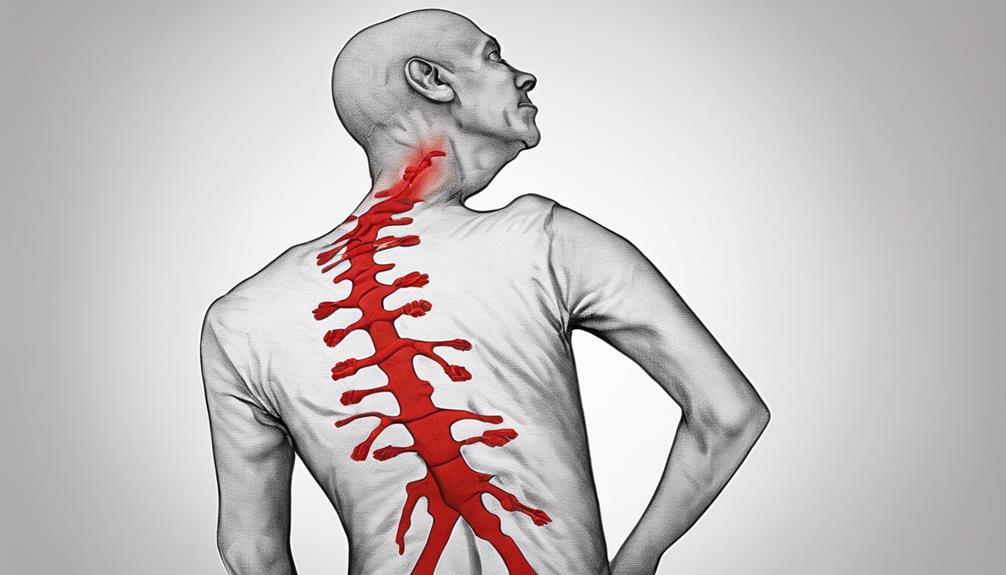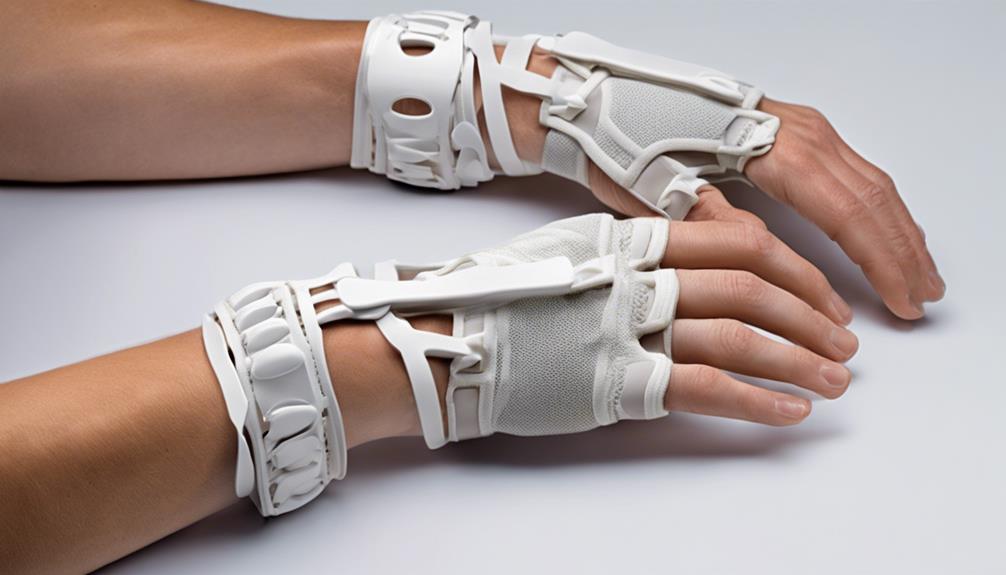Have you ever considered the possible risks of cracking your neck, especially in relation to arthritis?
While the satisfying pop may offer temporary relief, the long-term effects remain a topic of concern.
Understanding the nuances of how neck cracking impacts joint health and the development of arthritis is crucial for making informed decisions.
Let's explore the latest insights and expert opinions to unravel the mystery behind this age-old practice and its implications for neck health.
Key Takeaways
- Neck cracking doesn't cause neck arthritis.
- Genetics and wear and tear contribute to neck arthritis.
- Seek medical attention for persistent neck pain.
- Safe neck cracking practices can prevent joint damage.
Understanding Neck Cracking and Arthritis
Exploring the relationship between neck cracking and arthritis reveals important distinctions in understanding their impact on neck health.
When we crack our necks, it's often accompanied by a popping sound, which can be unsettling to some. However, it's essential to know that neck cracking doesn't cause neck arthritis. The sound occurs due to gas bubbles in the synovial fluid within the joints, and it's harmless.
On the other hand, neck arthritis, also known as cervical spondylosis, is caused by the wear and tear of cartilage in the neck joints over time. Factors such as genetics, previous neck injuries, and occupations that strain the neck can contribute to the development of neck arthritis.
While orthopedic surgery may be necessary in severe cases of neck arthritis, there's no evidence to support the notion that neck cracking accelerates the development of this condition. Therefore, it's crucial to seek medical attention if you experience persistent neck pain or any concerning symptoms, as neck cracking and neck arthritis are unrelated.
Debunking the Myth: Neck Cracking Risks

Debunking the myth surrounding neck cracking risks reveals the crucial distinction between harmless joint sounds and the development of arthritis in the neck. When it comes to neck cracking, there's a pervasive misconception that it leads to long-term damage such as arthritis. However, Orthopedic experts have clarified that this belief is unfounded. Here are three essential points to dispel this myth:
- Neck cracking doesn't cause arthritis: Contrary to common belief, the audible popping sounds during neck cracking are harmless and typically result from gas bubbles in the joint fluid.
- No evidence supports a link between neck cracking and arthritis development: Scientific studies haven't found any association between the two. Arthritis in the neck is more commonly attributed to factors like genetics, wear and tear of cartilage, injuries, or occupational strain.
- Understanding the actual causes of neck arthritis is crucial: Rather than neck cracking, factors such as genetic predisposition, trauma, and repetitive strain play significant roles in the development of arthritis in the neck.
Expert Insights on Arthritis Development
Neck cracking, despite common misconceptions, hasn't been proven to be a cause of arthritis development, as clarified by Orthopedic experts. While cracking your neck may lead to temporary relief from neck pain, it isn't directly linked to the development of cervical osteoarthritis.
Arthritis in the neck, also known as cervical spondylosis, is typically a result of wear and tear on the joints and discs in the neck over time. This chronic pain condition can affect individuals over 50, and in some cases, younger individuals who've experienced neck injuries.
It's essential to understand that various types of arthritis, such as rheumatoid arthritis and osteoarthritis, can impact the neck region. To manage neck pain and prevent potential joint damage that may contribute to arthritis, it's crucial to seek advice from healthcare professionals and explore safe practices, including appropriate exercises and home remedies.
Tips for Safe Neck Cracking Practices

To ensure the safety of your neck health, it's advisable to adopt mindful and controlled techniques when cracking your neck. Here are three tips for safe neck cracking practices: Firstly, always use gentle pressure and avoid any forceful movements that could strain your neck muscles or cause injury. Additionally, maintaining regular neck stretches and exercises can help alleviate tension, reducing the need for frequent cracking. Just as you practice proper handwashing techniques to prevent the spread of germs, it’s important to approach neck care with caution to avoid long-term damage.
- Limit the Frequency: Excessive neck cracking can potentially damage ligaments and cartilage, leading to long-term joint issues. Therefore, it's crucial to crack your neck sparingly to prevent unnecessary strain on the neck.
- Be Mindful of Force: When cracking your neck, apply gentle and controlled force to avoid irritating the joints and risking nerve damage. Abrupt or forceful movements can put undue stress on the neck structures, increasing the chances of developing arthritis over time.
- Consult Pain Management Experts: If you have concerns about the impact of neck cracking on arthritis risk, seek advice from pain management specialists. They can provide guidance on safe techniques and help you manage any discomfort effectively, ensuring optimal joint health in the long run.
Managing Neck Health and Arthritis
Understanding the importance of proactive measures in maintaining neck health and managing arthritis is crucial for overall well-being. While neck cracking doesn't directly cause arthritis, it can contribute to wear and tear on the joints, leading to conditions like cervical spondylosis.
Symptoms such as pain and stiffness in the neck, shoulders, and arms could indicate arthritis. If you experience numbness or tingling, especially after neck injuries or if you're over 50, it's essential to address these concerns promptly. Various types of neck arthritis exist, including degenerative joint disease and rheumatoid arthritis.
To feel better and manage neck health effectively, consider scheduling an appointment with pain management experts. They can help identify underlying issues, provide guidance, and offer treatments to alleviate discomfort. By being proactive and seeking professional advice, you can take steps towards better neck health and overall well-being.
Frequently Asked Questions
Can You Damage Your Spine by Cracking Your Neck?
Cracking your neck can potentially cause damage to your spine, leading to issues like muscle strain or even injury to the delicate structures in your neck. It's essential to be cautious when performing this action, as excessive force or improper technique can harm your spine.
Seeking guidance from a healthcare professional is advisable if you experience persistent neck discomfort to ensure your spine's health and well-being.
Is It Safe When a Chiropractor Cracks Your Neck?
When a chiropractor cracks our neck, it's safe when done by a trained professional. Chiropractic care aims to improve mobility and relieve tension in the spine. Techniques used by chiropractors are typically safe and effective.
Seeking regular chiropractic care can help maintain spinal health and reduce the need for self-cracking. It's crucial to consult a qualified chiropractor for personalized advice on the benefits and safety of neck adjustments.
Why Does My Neck Suddenly Hurt After Cracking?
When cracking your neck, sudden pain may occur due to joint irritation or muscle strain. This discomfort might signal the need for professional evaluation. It's crucial to seek medical advice if the pain persists for proper diagnosis and treatment.
Ensuring proper technique during neck cracking can help prevent sudden discomfort or stiffness. Remember, taking care of your neck's health is essential for overall well-being.
What Happens if You Crack Your Neck Too Much?
When you crack your neck too much, excessive pressure on the joints can lead to ligament and cartilage damage, increasing the risk of joint instability and potential osteoarthritis development.
This can cause chronic pain, stiffness, and reduced neck mobility over time.
Seeking professional guidance is essential to address concerns about overcracking and its impact on long-term neck health.
Conclusion
In conclusion, it's important to remember that neck cracking doesn't cause arthritis. By debunking this myth, we can focus on proper neck health and seek medical advice for any persistent issues.
Like a gentle breeze that clears the air, understanding the facts can help us navigate our health journey with clarity and peace of mind.
Let's prioritize our well-being and make informed choices for a healthier future.










